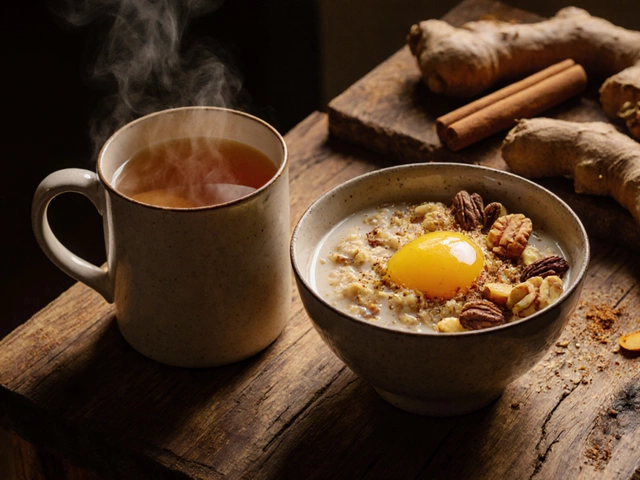Vata dosha is like the wind—it's all about movement and flexibility. But when Vata gets too high, it can leave us feeling scattered and anxious. So, what's the trick to keeping this airy dosha grounded? The answer lies in avoiding certain foods and habits that send it spiraling out of balance.
Let's start with diet. If you have a Vata dominance, avoid cold and dry foods as they can rob you of the warmth and moisture you need. Instead, opt for warm, cooked meals that are easy on digestion. Think soups, stews, and well-spiced dishes.
Apart from food, daily habits play a big role in balancing Vata. Cut down on activities that increase restlessness, like overconsumption of caffeine or irregular sleeping patterns. Aim for a steady routine—a regular sleep schedule can work wonders. Keep reading to find out more about what makes Vata tick, and how to embrace a lifestyle that keeps it in check.
- Understanding Vata Dosha
- Foods to Skip
- Lifestyle Habits to Avoid
- Embracing Warmth
- Daily Routine Tips
- Mindful Practices
Understanding Vata Dosha
In Ayurveda, understanding your dosha is key to mastering balance, and Vata is one of the three primary doshas. It represents the elements of air and space, which means it's all about movement and change.
Vata is characterized by qualities that are dry, light, cool, and mobile. If you've ever felt a rush of creativity only to ditch it for something new before finishing, that's Vata energy at play. This dosha is kind of like the wind—always moving!
Characteristics of Vata
- Quick to learn and quick to forget. Ever forget where you left your keys?
- Enthusiastic and creative, but sometimes scattered.
- Light sleeper, with often interrupted sleep patterns.
- Prone to dry skin, cold hands and feet, and sensitivity to cold weather.
Balancing the Vata Dosha
When in balance, Vata brings creativity, enthusiasm, and agility. But an excess can lead to fear, restlessness, and a frazzled mind. Those with a dominant Vata need to focus on grounding and warming practices.
Simple ways to balance Vata include sticking to a regular routine, eating warm and moisturizing foods, and staying cozy in cold weather. Regular yoga and meditation can also help in calming the nervousness that can come with an imbalanced Vata.
Did You Know?
Interestingly, according to some Ayurvedic texts, Vata is often the first dosha to become imbalanced in a busy and erratic lifestyle, which highlights the importance of paying attention to it. As cities grow busier, knowing how to nurture your Vata can be invaluable.
Understanding the Vata dosha is the first step towards finding balance, and by tweaking your lifestyle and diet, you can keep that wind-like energy working for you rather than against you.
Foods to Skip
For those who have a predominant Vata dosha, picking the right foods can make a huge difference in staying balanced. Vata types are characterized by their cool, light, and dry qualities, so it's important to avoid foods that amplify these traits.
Ditch the Cold and Raw
Cold and raw foods like salads and smoothies might seem healthy, but for Vata, they can be a recipe for imbalance. These foods increase coldness and dryness, which can lead to issues like bloating or constipation. So, it's better to lean towards cooked meals that bring warmth and nourishment.
Avoid Dry and Crunchy Snacks
Dry foods such as crackers, popcorn, and chips can aggravate Vata's dryness. Although they might be tasty, they're not the best match for your dosha. Instead, opt for oily or moist snacks such as nut butter or soaked dried fruits like raisins or dates. These not only satisfy your craving but also help in pacifying Vata's dry nature.
Steer Clear of Caffeine and Alcohol
Both caffeine and alcohol can over-stimulate the senses, increasing restlessness and anxiety common with Vata imbalance. If you're a coffee lover, try limiting your intake and swap with herbal teas like ginger or chamomile, which are more soothing.
Don’t Overdo Spices
While spices are warming and can be beneficial, overdoing pungent and astringent spices like chilies, raw garlic, and onion can overexcite Vata. It's best to stick with milder spices like cumin, coriander, and cinnamon, which add warmth without the intensity.
Here's a quick glance at some foods to be mindful of:
| Category | Foods to Skip |
|---|---|
| Cold & Raw | Salads, smoothies, iced drinks |
| Dry | Chips, popcorn, crackers |
| Stimulating | Caffeine, alcohol |
| Spices | Chilies, raw garlic |
In a nutshell, focus on comfort foods that are warm, moist, and calming to ensure you keep your Vata in a happy place. Making these small changes can have a big impact on how you feel both mentally and physically.
Lifestyle Habits to Avoid
Living with a Vata imbalance often feels like you're constantly on the move, mentally and physically. But too much movement can actually aggravate the condition. So, what habits should you kick to keep things calm and collected?
Overworking
Vata types have a natural tendency to dabble in many things at once. While multitasking might seem efficient, it can increase stress and anxiety. Give yourself permission to focus on one task at a time and set boundaries for work. By doing so, you can help maintain balance.
Skipping Meals
Vata thrives on regularity, and skipping meals can disrupt this balance. It’s essential to stick to regular meal timings. Your body needs consistent fuel, so aim for three wholesome meals a day, with snacks in between if necessary. This helps maintain energy and keeps your digestive system happy.
Irregular Sleep Patterns
Late nights and irregular sleep don't do any favors for Ayurveda balance. Try to go to bed and wake up at the same time every day. Wind down with calm activities like reading or gentle yoga. A good night’s sleep can hugely improve how grounded you feel.
Excessive Stimulation
For the overactive Vata, overly loud environments or too much screen time can be overwhelming. Digital detoxes or stepping away from technology can work wonders. Also, try engaging more in activities that promote relaxation, like meditation or listening to soothing music.
Neglecting Self-Care
Setting aside time for self-care is vital for anyone with a Vata dominance. Incorporate warm baths, regular oil massages, or calming herbal teas into your routine. Simple habits like these can stabilize your energy and promote an overall sense of well-being.
Tackling a Vata imbalance requires intent and attention to detail, but by adjusting these lifestyle habits, you can nurture a more balanced and stable life.

Embracing Warmth: The Vata Way
One of the simplest ways to balance Vata is by surrounding yourself with warmth. This doesn't only mean physical warmth but emotional and mental warmth too. The idea is to reduce exposure to anything cold and harsh, which are the exact opposite properties of a balanced Vata.
Warmth in Diet
When it comes to diet, go for warm, soupy dishes that are easy to digest and seasoned with warming spices like ginger and cumin. These help in kindling the digestive fire, or 'Agni', which is often a bit low in Vata types.
- Include spiced teas such as ginger or cinnamon tea.
- Prefer cooked vegetables over raw ones.
- Use healthy oils like sesame or olive oil in cooking to add moisture and warmth.
Creating a Warm Ambience
Your environment matters a lot. Keep your living space cozy and inviting to help calm the restless Vata mind. Use soft lighting, warm colors, and plush seating to create that soothing vibe.
Adding a bit of warmth isn't just about comfort; it can even make a rainy or cold day feel much more bearable. Also, humidifiers can be a great tool in dry climates to keep the air moist, something that benefits Vata greatly.
Dressing for Warmth
As for clothing, opt for layers of warm, soft fabrics like wool or cashmere. The key is to stay snug and avoid exposure to cold drafts, which can quickly throw Vata off balance.
| Season | Clothing Type | Vata Impact |
|---|---|---|
| Winter | Woolen sweaters | Positive, warmth |
| Summer | Light layers | Neutral, airy |
Warm Mentality
Let's talk about emotional warmth. It might sound a little woo-woo, but hear me out. Surround yourself with people who have warm personalities, those who radiate positive and calming energy. It’s amazing how much this can help mitigate that characteristic Vata anxiety.
In a nutshell, bringing warmth into all aspects of your life can really help keep that airy Vata grounded and balanced. Next time you feel a little out of sorts, try integrating some of these tips and see how you feel.
Daily Routine Tips
Keeping Vata balanced is often about finding that sweet spot between activity and rest. Having a daily routine can be your secret weapon here. Vata types tend to thrive on regular schedules, so let's talk about how to make your day work for you.
Wake-Up and Wind-Down
Start your day early, ideally around sunrise. It gives you a head start and helps you catch the calm morning vibes. Be sure to wind down early too. A consistent sleep schedule is crucial for taming Vata's restless nature. Think about aiming for seven to nine hours of good sleep.
Meals and Snacks
Stick to regular meal times. Eating three balanced meals a day does wonders for keeping your energy steady. And when it comes to snacks, reach for something warming and grounding—like a handful of nuts or a warm herbal tea.
Exercise and Activity
Movement is important, but it’s all about balance for Vata. Go for gentle exercises like walking, yoga, or tai chi. These activities keep you grounded without overwhelming your system. Too much high-intensity workout can scatter that vital Vata energy.
Relaxation and Reflection
Make time for relaxation. Meditation, breathing exercises, or a calming bath can work wonders. These activities help reduce stress and bring a sense of tranquility to your day.
Practical Schedule Example
| Time | Activity |
|---|---|
| 6:30 AM | Wake-up & Morning Routine |
| 7:00 AM | Light Yoga or Stretching |
| 8:00 AM | Breakfast |
| 12:00 PM | Lunch |
| 3:00 PM | Relaxation Break |
| 6:00 PM | Dinner |
| 8:00 PM | Wind-down & Reflection |
| 10:00 PM | Bedtime |
By sticking to a thoughtful routine, you'll help your body adapt to the world around you. These small changes can make a big difference for Vata balance. So why not give it a shot?
Mindful Practices
When it comes to balancing the Vata dosha, practicing mindfulness is key. Why? Because it helps bring focus and calm to the whirlwind of thoughts that often accompany a Vata imbalance. Let's explore some of these practices that can make a real difference.
Meditation
Daily meditation can do wonders. Start with just five minutes a day, gradually working up to 20 minutes or more. Focus on your breath—it’s grounding and helps center the mind. Consider guided meditations if you find silence daunting. They're excellent for keeping the mind on track.
Breathing Exercises
Also known as Pranayama, these exercises increase oxygen flow to the body and help stabilize Vata's airy nature. Try Nadi Shodhana, or alternate nostril breathing. It’s simple and yet so effective. Practice for five to ten minutes to help calm the nerves.
Yoga
Yoga isn’t just about movement—it’s also about balance. Choose poses that are grounding like Tree Pose or Warrior II. Keep your practice slow and deliberate, focusing on the connection between your breath and movement. It gives Vata the structure it sometimes lacks.
Journaling
Writing down your thoughts can have a soothing effect. It helps you organize your mind and release pent-up emotions. Make it a habit before bed or in the morning. This little ritual can help you unwind and set a positive tone for the day.
Aromatherapy
Scents like lavender or sandalwood have a calming effect, perfect for restless Vata types. Use them in a diffuser or as an oil for massage to promote relaxation. The key is consistency to really feel the benefits.
Mindful Eating
Eating isn’t just about the food—it’s an experience. Focus on slow, intentional bites, savoring each flavor. This not only aids digestion but also helps Vata stay present.
Incorporating these mindful practices into your routine may seem like a lot at first, but even small steps can lead to profound changes. Choose two or three practices to start, and see how they begin to bring harmony to your day-to-day life.





